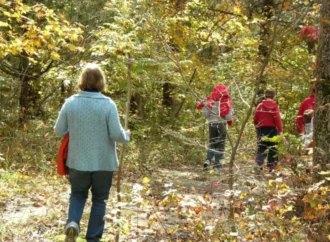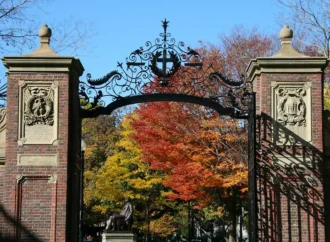Standing before a dozen microphones in Wisconsin on Tuesday, Julia Jackson called for prayers and healing – not violence – following the shooting of her son, Jacob Blake.
“If Jacob knew what was going on as far as that goes, the violence and destruction, he would be very unpleased,” Mrs. Jackson said.
Blake, a 29-year-old African American man, was shot seven times by Kenosha police who had responded to a domestic dispute call on Sunday. Reports say Blake, who had a knife in his car along with his three children, suffered damage to his small intestine, kidney, colon, liver and stomach, and may be permanently paralyzed.
In the wake of the shooting, which was recorded and quickly went viral on social media, Kenosha, a city about 45 miles south of Milwaukee, experienced consecutive nights of arson, vandalism, and looting.
Jackson’s message to those wielding matches, hammers, and “firebombs” in the name of her son was simple.
“Please don’t burn up property and cause havoc and tear your own homes down in my son’s name. You shouldn’t do it,” she later told CNN’s Don Lemon.
Her words have apparently fallen on deaf ears.
Violence erupted again Tuesday night, resulting in the death of two Black Lives Matter activists. A 17-year-old Illinois man, Kyle Rittenhouse, who arrived to assist local police, was arrested in connection with the shootings and charged with first degree murder.
The violence in Kenosha resembles similar spasms of violence that erupted across the country in the wake of the death of George Floyd, a 46-year-old African American from Minnesota who died at the hands of Minneapolis police while being arrested.
Floyd’s death sparked discussion on police brutality, systemic racism, and social justice in America, as well as mass protests that at various points devolved into riots, looting, and other forms of violence. Cities such as Seattle, Minneapolis, and Portland saw police forces overwhelmed and forced to evacuate.
The summer of 2020 is already the worst season of political violence America has witnessed since the 1960s. Yet, unlike Jacob Blake’s mother, many have been reluctant to condemn the violence. In fact, many have openly supported it.
Kellie Carter Jackson, an assistant professor of African studies at Wellesley College, defended the use of violence as a vehicle for political change.
“Many people are asking if violence is a valid means of producing social change. The hard and historical answer is yes,” Carter Jackson wrote in The Atlantic days after 75 fires were reported in Minneapolis. “Riots have a way of magnifying not merely the flaws in the system, but also the strength of those in power. The American Revolution was won with violence. The French Revolution was won with violence.”
In a June event hosted by Oberlin College titled “After Minneapolis: A Teach-In on the George Floyd Uprising,” Jennifer R. Garcia offered a similar defense of political violence, saying Floyd’s death offered a great opportunity for change.
“Protests, even when there is violence, can make it a more salient issue, and can provide greater pressure on elected officials and candidates,” explained Garcia, a professor of comparative studies at Oberlin. “What we know in political science is that protest matters. And actually when we see destruction of buildings, when we see violence … we actually see greater response by elected officials.”
If you want to understand why America is getting more violent, listen to this Oberlin prof.
She cooly advocates violent protests because, as she explains, violence works.
She never mentions what will happen once the other side adopts the same tactic.
— Jon Miltimore (Parler: @Miltimore79) (@miltimore79) July 28, 2020
These defenses of violence were not slips of the tongue. They are well-reasoned and carefully thought out. Both Garcia and Carter Jackson defend violence for its political utility.
In some ways, this is not surprising. Violence has long been seen as the fertilizer of revolutions, a tool that can achieve rapid political change.
“Violence is the midwife of every old society pregnant with a new one,” Karl Marx famously wrote.
Marx didn’t just defend the use of violence. He saw violence as an inevitable component of political change. As the philosopher Hannah Arendt observed in her essay “On Violence,” Marx didn’t see violence as the cause of the revolution any more than birth pangs are what cause a child to be born. Both are simply natural byproducts of an unstoppable event.
For many progressives – conditioned to see the world between the narrow lens of oppressed vs. oppressor – the allure of violence is too great. It is seen as the sword the oppressed classes of the world can wield to sunder their metaphorical chains. A way for man to “re-create” himself, in the words of Jean Paul Sartre, allowing the “wretched of the earth” to “become men.”
It’s for this reason that many have been reluctant to condemn riots, looting, arson, intimidation, and physical attacks. Like Sartre, many see violence as the great equalizer for the oppressed.
Elderly man defending store during Kenosha riots has jaw broken https://t.co/HUHKBpCiug pic.twitter.com/wA85Vvg3Gm
— New York Post (@nypost) August 27, 2020
Despite its attractiveness to the intellectual class, there are at least three reasons to reject political violence. The first is that it is ineffective.
As Amitai Etzioni recently observed in The National Interest, evidence suggests nonviolent political movements have a much higher rate of success than violent ones. Etzioni, a German-born Israeli sociologist, points to research collected by University of Denver Professor Erica Chenoweth, who analyzed all major liberations movements – violent and non-violent – since 1900.
“Her data shows that from the 1960s to 2006 the success rate of nonviolent movements was consistently higher than that of violent movements, and, within recent decades, the success rate of violent movements decreased steeply while the success rate of nonviolent movements greatly increased,” writes Etzioni.
The ineffectiveness of violence might explain why many progressives around the country this week emerged to denounce various forms of violence after months of silence, including Oregon Governor Kate Brown, Washington, DC Mayor Muriel Bowser, and CNN’s Don Lemon.
Apparently Americans don’t like it.
“The rioting has to stop,” Lemon bluntly stated to fellow CNN host Chris Cuomo. “It’s showing up in the polling, it’s showing up in focus groups.”
“The rioting has to stop… it’s showing up in the polling, it’s showing up in focus groups.” Don Lemon pic.twitter.com/xiFsowHbhb
— JohnWMarxII (@JohnWMarxII) August 26, 2020
Let me be clear: It’s time for the violence and vandalism to end so Portland can focus on the important work to be done to achieve real change for racial justice. Those who have committed acts of violence will be held accountable.
— Governor Kate Brown (@OregonGovBrown) August 25, 2020
D.C. Mayor Bowser condemns protesters seen in viral video heckling diners https://t.co/gBkfLjVDdj pic.twitter.com/uDVArlwxjc
— The Hill (@thehill) August 26, 2020
Secondly, even when political violence “succeeds,” its fruits often turn out to be bitter indeed. Marx and company are not wrong about the potency of violence. It can indeed be a powerful tool in the hand of revolutionaries, but it’s also a dangerous one as any student of history can see.
Nor is violence easily turned off once it begins.
The Jacobins in France were able to use violence to seize power, only to find they could not contain the violence they had unleashed. Russia under the Bolsheviks did not become a peaceful place once the Mensheviks were extinguished. (The same can be said of China under Mao and numerous other revolutions.)
Political violence tends to spin out of control, as Rev. Martin Luther King Jr. recognized. “Hate begets hate; violence begets violence,” he famously said. “The ultimate weakness of violence is that it is a descending spiral begetting the very thing it seeks to destroy, instead of diminishing evil, it multiplies it.”
King’s words are a reference to Matthew 26:52, where Jesus of Nazareth orders his disciple Simon Peter to stay his sword as Jesus is arrested by the Romans.
“Put your sword back in its place,” Jesus said to him, “for all who draw the sword will die by the sword.”
This brings us to the third reason to oppose political violence: many view it as morally wrong.
For some – from the seventeenth-century Anabaptists and Colonial-era Quakers to figures such as Leo Tolstoy and Mohandas Gandhi, whose non-violent resistance inspired MLK – this means rejecting all forms of violence, even self-defense.
Many, however, have found the Non-Aggression Principle a more workable moral philosophy to live by. The economist Murray Rothbard notes that the principle has a caveat that pacifism lacks.
“The fundamental axiom of libertarian theory is that no one may threaten or commit violence (“aggress”) against another man’s person or property,” Rothbard wrote. “Violence may be employed only against the man who commits such violence; that is, only defensively against the aggressive violence of another.”
The current wave of violence in America does not meet this standard. Seeking to create political change by attacking innocent third parties, such as small business owners, random citizens and their property, is aggression.
Let’s say that the police shootings of George Floyd and Jacob Blake were unjustified. According to the Non-Aggression Principle, that would mean that Floyd and Blake would have been justified in defending themselves. It also would mean that the victims and his family would be justified in securing restitution from those responsible for the shooting. But it would not justify assault, looting, vandalism, and arson perpetrated against innocent people who happen to live in the area of the shooting.
As one stunned Kenoshan whose business was burned down put it simply, “We didn’t do anything to anybody. Why did we deserve it?”
“We didn’t do anything to anybody. Why did we deserve it?,” says a small business owner in #Kenosha after his business was burned down by rioters in the city.pic.twitter.com/8pNC2jFx4b
— Daily Caller (@DailyCaller) August 25, 2020
And regardless of who was at fault in the shooting involving Kyle Rittenhouse, it was precipitated by the mass political violence against innocent third parties that had engulfed Kenosha. Aggressive violence begets violence.
By creating innocent victims, aggressive political violence also alienates those who might otherwise sympathize with a particular cause, which explains why it is so counterproductive, as discussed above.
America is at a pivotal crossroads. If the nation decides to accept political violence as a legitimate tool in its pursuit of a worthy goal – police reform – they may soon find themselves in a world far more violent.
All Americans of good faith should carefully consider the words of Julia Jackson.
“[Violence] is just not acceptable.”
—
This article was originally published on FEE.org. Read the original article.
Image Credit:
YouTube-Reuters, ” Jacob Blake’s mother praying for son and nation’s healing “
















Leave a Comment
Your email address will not be published. Required fields are marked with *